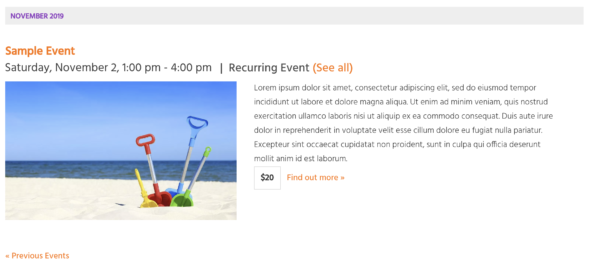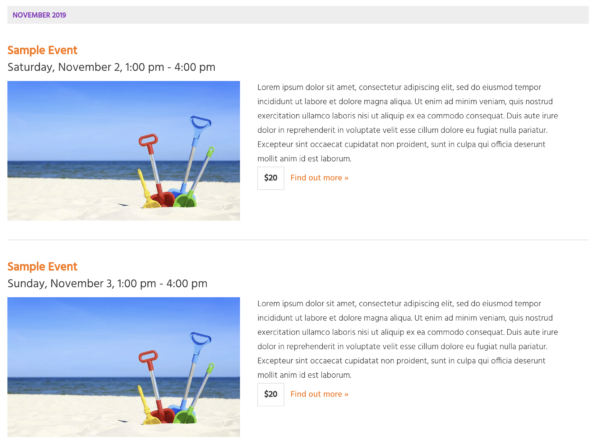12 things to consider before diving in

A well-designed and properly maintained events calendar can drive new traffic to your WordPress website, as well increase attendance at events. While the concept seems simple enough, there are many factors that need to be carefully considered before design begins.
As web developers, we have created many online calendars. Some are extremely simple, and others more complex. We have learned that the more information we get up front, the better. The more clearly we understand the ins-and-outs of the organization, the easier it will be for us to create a calendar that allows users to find the information they need.
First, do you really need a calendar of events?
Sometimes clients come to us with very specific requests. They’ve found a theme or a plugin that seems to be just what they need. However, after reviewing the specific requirements, we often discover a cleaner, simpler and less expensive approach. If you think your website would be improved by the addition of an online calendar, read on. We’ll help you determine if this is the right route for you.
What is an online calendar?
An online calendar is a web application that allows one or more people to edit and share event information through a website or app. There may be support for recurring events, and it can usually be viewed as a list or in monthly grid format. In addition, all styling is applied consistently, so that events look uniform. This includes font and image size and spacing.
As with most things related to the web, simpler is often better. Adding plugins is necessary to expand functionality, but it’s important to use only the ones you really need. If there is a way to achieve the same result without a plugin, that is usually the best option.
To determine whether you need to use a calendar plugin, or if a simple page that allows you to list events is the better option, answer these three questions.
Do you have enough events to warrant a true calendar of events?
Does it need to be in a grid format?
Would you be better off with a simple list of events?
Often when a client asks for a calendar, they really just need an area to post upcoming events. It doesn’t need to work like a true calendar. For example, your organization may hold a meeting every other month. In that case, installing a calendar plugin would be unnecessary. You would be better off simply listing the event dates, times and locations.
Okay, so you’ve determined that you do, indeed, need a full-featured calendar. Now we suggest that you think through all the information to be included in the calendar.
Below are 12 questions to help clarify your requirements:
1. If an event happens over many days, will each instance of the event have exactly the same information and use the same image?
One key advantage of using a calendar plugin is efficiency. Rather than manually entering every instance of each event, a plugin may allow you to enter all the information one time in one place.
When setting up your calendar, it’s important for us to understand the details of the events you host. Do any of your events span more than one day? If an event spans multiple days, does it always start and end at the same time? Are the details of what happens each day the same? Will you want the same image displayed for each day of the event, or will you want different images on different days?
2. Should events be categorized?
Search is a built-in feature of most WordPress calendars. Typically, the visitor can search for an event by name or by date. Adding categories to your events offers a third way to search.
Let’s say that your organization screens a movie every Friday night and has live music on Saturdays. All films could be under the movies category and all the bands could be in the live music category. To see all events in the movie category, click on movies. To see all events in live music category, click on live music.
3. How should multi-day events be displayed?
Most calendars can be viewed as a list or as a grid (month view). If an event occurs more than one time, how will you want the event to be listed? Would you prefer it show one time, and in the description list all the dates? Or would you prefer that it be listed each time it occurs?
In the example below, the calendar groups multiple instances of an event as a single entry.
While the event occurs Saturday and Sunday, November 2 and 3, the calendar displays it just one time.

Alternatively, below is an example of website that displays each event individually.

4. How does the information to be presented on the multi-event page differ from the single event page?
The grid or month format typically displays only the name of the event. The list view is usually an excerpted version of the full event. Decide what information is the most important and display that on the multi-event page. Then, the user can click through to see all the details of each individual event.
5. Are all events ticketed?
Other things to consider when creating an online calendar are ticket sales and registration. Are your ticket sales general admission or are purchasers buying specific seats? Will you want to manage your own ticket sales or will you use a third party system? Do all events require paid tickets or are some free?
6. Are there events that require registration rather than a ticket purchase?
If so, how will the information that needs to be collected for registration differ from a ticket purchase or a reservation?
7. How are the tickets purchased? In person, by phone, or online?
If you offer member and nonmember pricing, is there a limit to the number of tickets a member can purchase? Do ticket sales start and end the same for in person, phone and online purchases?
8. Are ticketing options the same for every event in the calendar?
9. How many different levels of ticket pricing are there?
10. Do you want to require people to set up an account with you before purchasing tickets?
11. Should previous events be listed or are old events to be deleted?
12. How many different people will enter information about the events? Will community members be able to submit events?
An online calendar of events can drive repeat traffic
Adding an online calendar gives readers a reason to return to your WordPress website. Also, when you send emails to your regular visitors, you can link back to events on your website. This can help keep the size of your email manageable, and users can easily click through to get more information or to purchase tickets.
Do you have questions about online calendars? Are you interested in having one added to your WordPress website? If so, give us a call at 518.392.0846 or email [email protected]. Find out about all our website development services.
